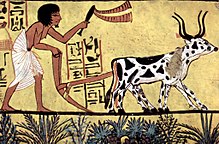旱地农业
外观
此条目可参照英语维基百科相应条目来扩充。 (2021年6月20日) |

 |
| 农业和农学 |
|---|
| 农业史 |
| 农业 |
| 其他类型 |
| 有关 |
| 分类 |
|
|
旱地农业是指与旱地有关的农业,它包括与非灌溉农作物有关的特定农业技术。旱地的气候特点是一年分为凉爽的雨季(在收获农作物前降雨可以为种植农作物的土壤注入大量水分)和温暖的旱季。[1][2]
描述
[编辑]旱地农业已发展成为一套适应有限水资源的技术和管理实践,[3]在旱地农业地区,农民在经济上应该能够承受偶尔的农作物歉收,或许可以连续几年。作为旱地农民的生存需要仔细管理作物可用的水分并积极管理费用以尽量减少贫困年份的损失。旱地农业需要不断评估任何给定作物周期中存在或缺乏的水分含量并进行相应的规划。旱地农民知道,要想在经济上取得成功,他们必须在丰年期间积极进取,以抵消干旱时期的影响。
旱地农业依赖自然降雨,这可能使地面容易受到沙尘暴的影响,特别是如果农业技术不佳或风暴在特别脆弱的时间袭击的话。事实上,轮作中必须包括休耕期,这意味著田地不能总是受到覆土作物的保护,否则覆盖作物可能会提供防止侵蚀的保护。
干旱区农业
[编辑]作为一个研究和发展领域,干旱区农业或沙漠农业包括研究如何提高缺乏淡水、充足的热量和阳光的土地的农业生产力,通常还包括以下一项或多项: 极端冬季寒冷、雨季短、盐碱地或水、强乾风、土壤结构不良、过度放牧、技术发展有限、贫穷或政治不稳定。
参考文献
[编辑]- ^ https://www.spektrum.de/lexikon/geographie/dry-farming/1810
- ^ https://www.spektrum.de/lexikon/geographie/regenfeldbau/6507
- ^ Kornei, Katherine. Dry farming could help agriculture in the western U.S. amid climate change. Science News. 9 March 2023 [9 October 2024].
进一步阅读
[编辑]- Henry Gilbert, Dryland Farming: January 1982–December 1990 (Beltsville, Md.: U.S. Department of Agriculture, National Agricultural Library, 1991)
- Mary W. M. Hargraves, Dry Farming in the Northern Great Plains: Years of Readjustment, 1920–1990 (Lawrence: University of Kansas, 1993)
- Oklahoma State Board of Agriculture, Report (Guthrie, OK: n.p. 1908)
- Dr. John A. Widtsoe, Ph.D. Dry-Farming, A System Of Agriculture For Countries Under A Low Rainfall (NY: The Macmillan Company, 1911)
- Victor Squires and Philip Tow, Dryland Farming: A Systems Approach – An Analysis of Dryland Agriculture in Australia (Sydney: Sydney University Press, 1991)
- O'Bar, Scott, (2013). Alternative Crops for Drylands – Proactively Adapting to Climate Change and Water Shortages. Amaigabe Press, Santa Barbara, CA ISBN 978-0-9882822-0-9
- Encyclopedia of Oklahoma History and Culture – Dry Farming
- P. Koohafkan and B.A. Stewart, Water and Cereals in Drylands published by The Food and Agriculture Organization of the United Nations and Earthscan (PDF)
- Steve Solomon, Water-Wise Vegetables: For the Maritime Northwest Gardener (Sasquatch Books, 1993)
